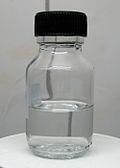Difference between revisions of "Formic acid"
(Created page with "{{Infobox_Miscellaneous | image = Formic_acid.jpg | origin = - | stowage factor = - | humidity and...") |
|||
| Line 8: | Line 8: | ||
}} | }} | ||
==Description== | ==Description== | ||
| − | + | Formic acid (also called methanoic acid) is the simplest carboxylic acid. Its chemical formula is HCOOH or HCO<sup>2</sup>H. It is an important intermediate in chemical synthesis and occurs naturally, most notably in ant venom. In fact, its name comes from the Latin word for ant, formica, referring to its early isolation by the distillation of ant bodies. Esters, salts, and the anion derived from formic acid are referred to as formates.<br><br> | |
| + | Formic acid is a colourless liquid having a highly pungent, penetrating odour at room temperature. It is miscible with water and most polar organic solvents, and is somewhat soluble in hydrocarbons. In hydrocarbons and in the vapour phase, it consists of hydrogen-bonded dimers rather than individual molecules. Owing to its tendency to hydrogen-bond, gaseous formic acid does not obey the ideal gas law. Solid formic acid (two polymorphs) consists of an effectively endless network of hydrogen-bonded formic acid molecules. This relatively complicated compound also forms a low-boiling azeotrope with water (22.4%) and liquid formic acid also tends to supercool. | ||
==Application== | ==Application== | ||
Revision as of 11:02, 8 January 2014
| Infobox on Formic acid | |
|---|---|
| Example of Formic acid |  |
| Facts | |
| Origin | - |
| Stowage factor (in m3/t) | - |
| Humidity / moisture | - |
| Ventilation | - |
| Risk factors | See text |
Formic acid
Description
Formic acid (also called methanoic acid) is the simplest carboxylic acid. Its chemical formula is HCOOH or HCO2H. It is an important intermediate in chemical synthesis and occurs naturally, most notably in ant venom. In fact, its name comes from the Latin word for ant, formica, referring to its early isolation by the distillation of ant bodies. Esters, salts, and the anion derived from formic acid are referred to as formates.
Formic acid is a colourless liquid having a highly pungent, penetrating odour at room temperature. It is miscible with water and most polar organic solvents, and is somewhat soluble in hydrocarbons. In hydrocarbons and in the vapour phase, it consists of hydrogen-bonded dimers rather than individual molecules. Owing to its tendency to hydrogen-bond, gaseous formic acid does not obey the ideal gas law. Solid formic acid (two polymorphs) consists of an effectively endless network of hydrogen-bonded formic acid molecules. This relatively complicated compound also forms a low-boiling azeotrope with water (22.4%) and liquid formic acid also tends to supercool.











